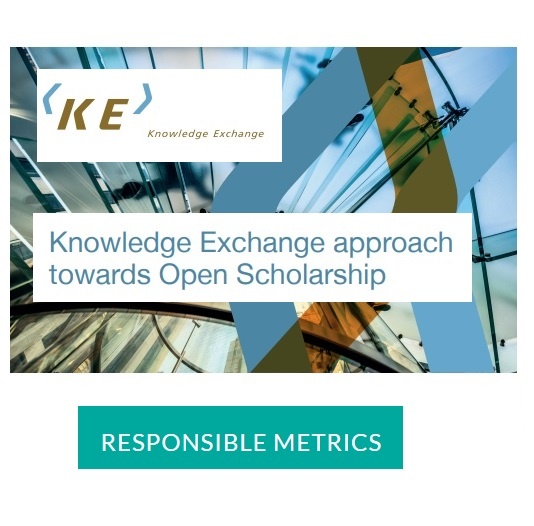Open Scholarship Output, Evaluation and Effects ... towards Responsible Metrics
19/09/2017


(Image source: Knowledge Exchange approach towards Open Scholarship, KE, 2017 (*))
Within the shift toward Open Scholarship - "here [*] intended as an inclusive synonym for Open Science, Open Research, Science 2.0 and other similar terms" - we need deeper understanding of HOW the MOTIVATIONS of different actors are affected by the interactions between system (MACRO), individual (MICRO) and organisations (MESO) ...
Practical interventions intended to IMPROVE the PROCESS OF EVALUATION are rarely assessed for their EFFECTS ... To move beyond there is a "need to fix the INCENTIVES” to questions of HOW and WHERE this can be done, and this will require a much greater understanding of how evaluation systems affect both the behaviour of individuals and the culture of communities.
|
Knowledge Exchange (KE) aims to take on activities that make Open Access and Open Scholarship more easily understandable and approachable, and thus to contribute to the establishment and enhancement of a well-functioning Open Scholarship eco-system. To inspire and advise KE on the work in the Open Scholarship area, the recently formed KE Open Scholarship Advisory Group (KEOSAG) will act as a "think tank plus" group of experts (from within and outside the partner organizations) to examine - from an integrated perspective - progress towards Open Scholarship and challenges of its implementation. |
While being particularly focused on two areas that are of special interest to the KE partners:
(1) the Economy of Open Science, and
(2) Output and Evaluation from the Researcher's Perspective,
a recently released (August 2017) KE's Report entitled : "Knowledge Exchange approach towards Open Scholarship":
- Describes the present situation of Open Scholarship,
- Addresses a range of challenges and opportunities for progress towards Open Scholarship,
- Presents the motivations for this latter and
- Proposes the navigation towards the realisation of the Open Scholarship eco-system. This is possible through the outlined idea of a KE Open Scholarship Framework (with recommendations proposed), which helps to Identify the Arenas (political -- economic -- social -- technology) and the phases of the Research Life Cycle where work needs to be done to better navigate towards Open Scholarship.
|
A key question is how culture affects (and effects) behaviour, and how external regulation and assessment affects culture. As this is a large topic, it is proposed to focus on two elements of the research life cycle in the first instance: (1.) Outputs, such as articles, books, preprints, protocols, software, shared data, etc. and the Having a thorough understanding of HOW RESEARCHERS FEEL about the current systems of RESEARCH EVALUATION, including their attitude towards the impact of Open Scholarship in this field, would help in:
Take a look at ‘Knowledge Exchange approach to Open Scholarship' and find out how these and other more complex and interdisciplinary questions and overwhelming growth in data generation provide opportunities and challenges for better research and its evalutation …. |
Overall, the report can be read like a roadmap for the transition towards Open Scholarship and seen as the enhancement of the past KE Conference "Pathways to Open Scholarship".
Source: KE Approach to Open Scholarship.
|
* “RESPONSIBLE METRICS can be defined by the following key principles:
|
